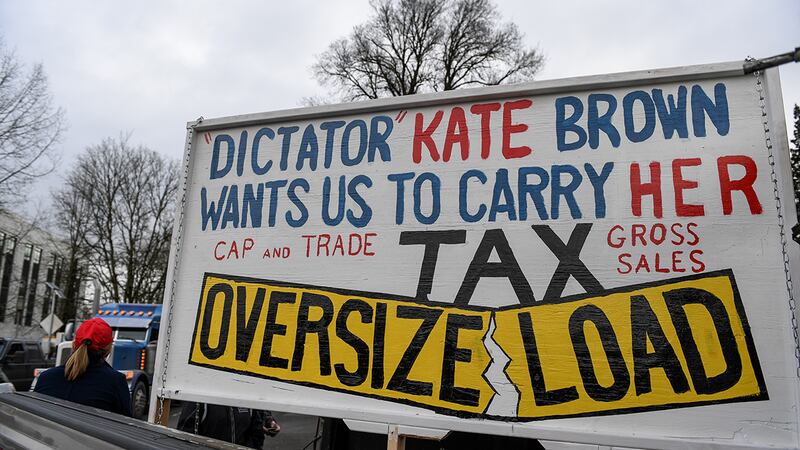Oregon's 18 rural electric co-ops say they were blindsided last week by Gov. Kate Brown's newly stated position on breaching four hydro-electric dams on the Snake River.
The co-ops serve 500,000 customers, mostly in rural Oregon, and depend on low cost hydro power from the Bonneville Power Administration, which operates the Columbia River and Snake River dams.
On Feb. 11, as the Associated Press first reported, Brown wrote a letter to Washington Gov. Jay Inslee, telling him she supported breaching the earthen portion of four dams on the Snake River.
"The science is clear that removing the earthen portion of the four lower Snake River dams is the most certain and robust solution to Snake River slamon and steelhead recovery," Brown wrote. "I believe restoring the lower Snake River must be a key presumption of our long-term solution for salmon and orca recovery, but much must be done before this is accomplished in order to help minimize and mitigate for potential harm to other vital sectors.

The debate over the Snake River dams isn't new.
Former Gov. John Kitzhaber called for breaching them 20 years ago, citing the threat they posed to endangered salmon runs.
And last year, U.S. Rep. Mike Simpson (R-Idaho), Idaho's senior congressman, encouraged environmentalists when he spoke in support of restoring the natural runs up the Snake.
The dams enjoy strong support from agribusinesses, which barge wheat and other products down the Snake to the Columbia and from the rural co-ops and their customers who depend on the electricity the dams produce.
Brown's letter drew a sharp response from the Republican members of Washington's congressional delegation.
"Gov. Brown's position is not only misguided, it is shocking and extreme," said U.S. Reps. Dan Newhouse, Cathy McMorris Rodgers and Jaime Herrera Beutler (R-Wash.), in a joint statement to the Tri-City Herald.
Brown's letter to Inslee is noteworthy not only because of the tension about the topic of dam removal but because of its timing: Oregon lawmakers are in the middle of the 2020 short session, in which the central piece of legislation is Senate Bill 1530, a carbon reduction effort that has highlighted the sharp divide between urban and rural Oregon.
In broad terms, the bill gets its support from mostly urban Democrats and is opposed by rural Republicans, particularly those sympathetic to the Timber Unity movement.
So Brown's letter to Inslee suggests taking away an existing carbon-free source of electrical generation from rural Oregon at a time she and her Democratic allies want rural Oregonians to bear the economic expense of shifting away from fossil fuels.
Brown's letter landed with heavy thud in the office of the Oregon Rural Electric Cooperative Association.
“It is stunning that during a serious legislative debate on carbon reduction, Governor Brown supports a course of action that is estimated to increase CO2 emissions by over 2 million metric tons – every year,” ORECA Executive Director Ted Case said in a statement. “This output is the equivalent of adding 421,000 passenger cars to the region’s roads each year. If the state of Oregon is serious about addressing climate change, they are now moving in the wrong direction.”
Brown’s spokeswoman, Kate Kondayen, says the governor’s letter has been taken out of context.
“While the letter says the most certain and scientific way to recover salmon and benefit orcas is to remove the dams, it does not ‘call for’ tearing them out; instead, Oregon is asserting that we see value in analyzing a future without the dams in the long term, but focusing any definitive next steps on working together to identify a viable path forward to that future with interim steps such as flexible spill agreements,” Kondayen says in an email.
“As the Governor clearly states in the letter, the region has not done adequate analysis of how to replace the power, water, and transportation benefits of the dams. Oregon has worked collaboratively to explore creative solutions that balance salmon recovery and sustainable power generation, as the region needs to work to a future where salmon and clean power coexist. Governor Brown’s emphasis is on that process of analysis and coming to agreement on a long-term vision.”
Here's a map of the service territories of the rural co-ops.

Supporters and critics of the Snake River dams are anxiously awaiting a new environmental impact report ordered by U.S. District Court Judge Michael Simon that will be made public next month.
Simon oversees a long-running federal case in which environmentalists and the BPA have battled over the fate of Columbia basin salmon.
